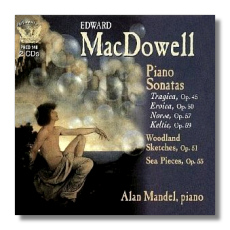
The Internet's Premier Classical Music Source
Related Links
- Latest Reviews
- More Reviews
-
By Composer
-
Collections
DVD & Blu-ray
Books
Concert Reviews
Articles/Interviews
Software
Audio
Search Amazon
Recommended Links
Site News
 CD Review
CD Review
Edward MacDowell

Piano Works
- Woodland Sketches
- Sea Pieces
- Piano Sonata #1 "Sonata Tragica"
- Piano Sonata #2 "Sonata Eroica"
- Piano Sonata #3 "Norse"
- Piano Sonata #4 "Keltic"
Alan Mandel, piano
Phoenix PHCD148 DDD 2 CDs: 67:26, 61:52
The piano music of American composer Edward MacDowell has suffered from undeserved neglect, even in the United States, and this two-CD set fills definite niches in the catalog. Alan Mandel's playing, while not always the most idiomatic, has much to recommend it, and he and Phoenix appreciate their duty to entertain and to educate listeners about what has been missing from their musical diets.
The opening notes on the first CD are among the most familiar in American piano music. "To a Wild Rose" from Woodland Sketches could easily be mistaken for the work of Edvard Grieg, perhaps one of his Lyric Pieces. In fact, MacDowell and Grieg were on good terms and knew each other's music; MacDowell's "Norse" Sonata is dedicated to the Norwegian composer. Where MacDowell and Grieg differ, however, is in the debt that their works pay to the Romantic performance tradition. Grieg's piano music can be showy, but it never is gratuitously so; while it can be a showpiece for the performer, the music usually has other priorities. Perhaps because of his early exposure to great piano virtuosos such as Teresa Carreño and Franz Liszt, MacDowell was more liberal about adding pyrotechnical appeal to his works. This is true more of his two piano concertos than of his solo works, but those who listen to this pair of discs will meet both MacDowell the thundering crowd-pleaser and MacDowell the quiet poet and serious thinker.
Another difference between Grieg and MacDowell is in the importance of nationalism in their work. Grieg offered authentic slices of Norwegian life to those who heard or played almost any of his music. MacDowell, while he recognized the importance of a national identity in American music, did not emphasize American culture in his compositions to the extent that Grieg emphasized Norwegian culture. Yes, MacDowell wrote music about American Indians and Uncle Remus, etc., but he clearly stated that nationalism was not a central feature of his career as a composer.
The ten Woodland Sketches and eight Sea Pieces, while miniature in size, often aspire to grand statements. The sonatas are not at all modest, as their subtitles suggest. As in Brahms' Tragic Overture, the conflict in MacDowell's Sonata Tragica seems more universal than personal. The Sonata Eroica is inspired by the Arthurian legends and contains an elfin and vaguely malevolent second movement that is suggestive of evil magic. The Third and Fourth sonatas are more concise; both also are "mythological" in nature. While not strictly programmatic, MacDowell's writing evokes heroes, villains, fair ladies, and life-and-death combats.
Mandel, currently a leading faculty member at American University in Washington, D.C., has specialized in performances and recordings of American piano music. He is at his best when MacDowell is at his most poetic; Mandel's glowing tone realizes the warmth of the composer's most intimate writing. When MacDowell's scores get thick, Mandel sorts out the individual lines, and when they become discursive, Mandel never loses the thread of the argument. In short, Mandel makes MacDowell easy to follow. However, he seems reluctant to surrender himself to the composer's most extraverted pages. I feel that Mandel has the technique, but not always the inclination to play like a Romantic piano virtuoso. It is possible, then, to imagine more sweeping interpretations than those offered here.
Naxos has released four CDs of MacDowell's piano music in recordings by James Barbagallo. I have not heard any of these discs yet, but they have been received positively by other writers – perhaps Barbagallo is more of a show-off than Mandel. As always with Naxos, the price is right, but Barbagallo has yet to record the First and Second sonatas. Mandel, then, remains first choice if you want to hear the Sonata Tragica and the Sonata Eroica. Phoenix's sound is fine, and the pianist's own annotations added much to my enjoyment of this music.
Copyright © 2001, Raymond Tuttle


















